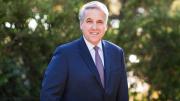President Lawrence S. Bacow today announced that Brian K. Lee will become Harvard’s new vice president for alumni affairs and development, succeeding Tamara Elliott Rogers (who is stepping down at year-end after leading the recently concluded, $9.62-billion Harvard Campaign). Lee’s appointment is effective November 19.
The appointment is significant on several counts.
First, it indicates the rapid pace at which Bacow is staffing his senior leadership team; the appointment of Claudine Gay as dean of the Faculty of Arts and Sciences was announced shortly after he became president on July 1, and filled the senior academic vacancy. No significant departures among the top tier of administrators (from the provost and executive vice president through the vice presidents) have been announced, indicating that the president intends to keep President Drew Faust’s team intact, enabling him to proceed quickly on effecting his agenda for the University.
Second, Bacow and Lee know each other well. He comes to Harvard from Caltech, where he became vice president for development and institute relations in April 2012—immediately after leading fundraising, alumni relations, and advancement communications at Tufts University under its then-president, Lawrence Bacow. As senior vice president of university advancement, Lee oversaw the Tufts Tomorrow campaign, concluded in 2002, just after Bacow arrived (it raised $609 million), and the Bacow-crafted Beyond Boundaries campaign, which raised more than $1.2 billion. (The planning for and strategic objectives of that campaign are detailed in this Harvard Magazine profile of Bacow’s career.)
Third, Lee has presumably become even more immersed in science and engineering during the course of shaping and managing the current Break Through: The Caltech Campaign, begun in April 2016 and at last report 80 percent of the way toward its $2-billion goal. Hard on the heels of The Harvard Campaign, it is radically premature for the University to contemplate its next huge fund drive, but it is conceivable—perhaps even likely—that Bacow will want to sustain the current fundraising momentum to bolster Harvard’s ambitions in biomedical research and the life sciences. Doing so would align closely with the current investments in engineering and applied sciences in Allston, and with possible partnerships with MIT, the affiliated hospitals, and other Greater Boston academic institutions.
Whatever agenda he outlines in his inaugural address on October 5 and in the months to come, Bacow has indicated his eagerness to pursue it rapidly. Now he has brought back to Cambridge a fundraising colleague with whom he has an established rapport—along with established credentials in development for a multi-school research university, at the highest level.









